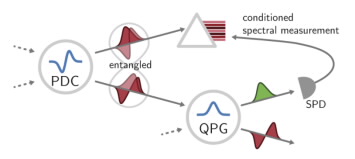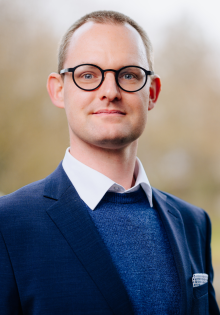Our recent work on the remote shaping of single photon spectra has been published in Optics Express and has been highlighted as Editor’s Pick. The research addresses the following problem.
Imagine you are given an object and you are asked to change one of its properties. In our case, the object is a light pulse with a broad colour spectrum, and we want to change the arrangement of colours. There is a catch, however: you are not allowed to touch the object. Not at all. In no way whatsoever!
If this seems like an unsolvable problem to you, you would be right in a classical world. Luckily enough, our world is quantum, and the strange behaviour of quantum objects allows us to solve the above task. We prepare two photons – light particles – whose colour spectra are entangled. Entanglement is a strange feature of quantum objects whereby the properties of two objects are more intricately linked than possibly allowed by classical physics. If we now manipulate and measure the colour spectrum of one of the photons, its sibling’s colour spectrum is manipulated accordingly. And all that without even touching it in the first place.
We prepare our photons through the process of parametric down-conversion. Here, a high-energy pump photon decays inside a second-order nonlinear medium into two lower-energy photons labelled signal and idler. Through a careful choice of material dispersion and by shaping the colour spectrum of the pump photon, we engineer the entanglement between the signal and idler photons. Then, using a device called quantum pulse gate, we measure one of the photons to exhibit a specific, user-chose colour spectrum – a so-called projection measurement. Its sibling will thereafter have a spectrum that is determined by the entanglement structure and the measurement. We verify this by measuring the second photon’s spectrum after projecting the first photon.
These results pave a way towards the remote, lossless and secure shaping of single photon spectra and thus will play a role in future quantum technologies based on the spectral degree of freedom of quantum states of light.
For more information, see Optics Express 28, 28295 (2020) or e-mail benjamin.brecht@upb.de


